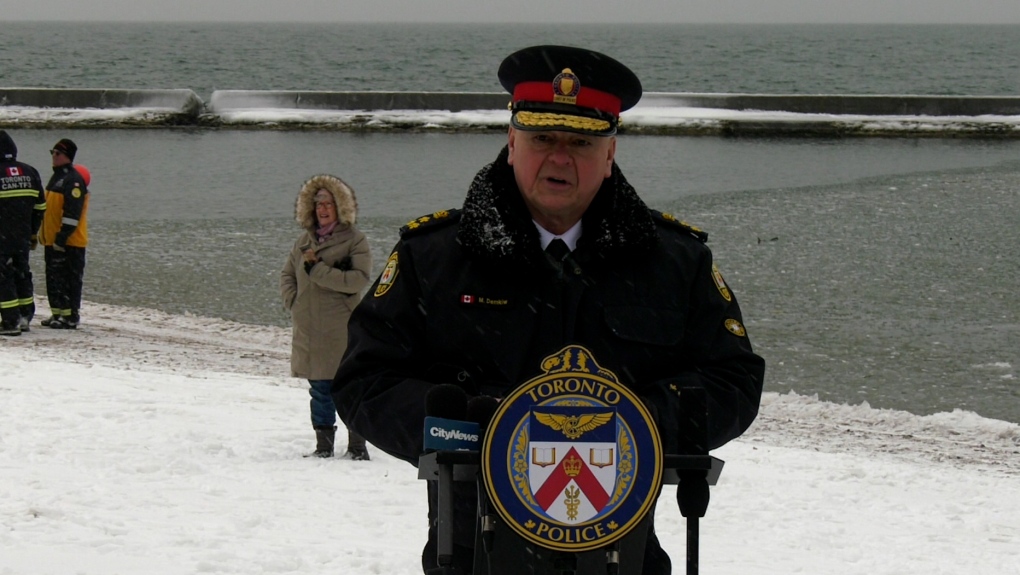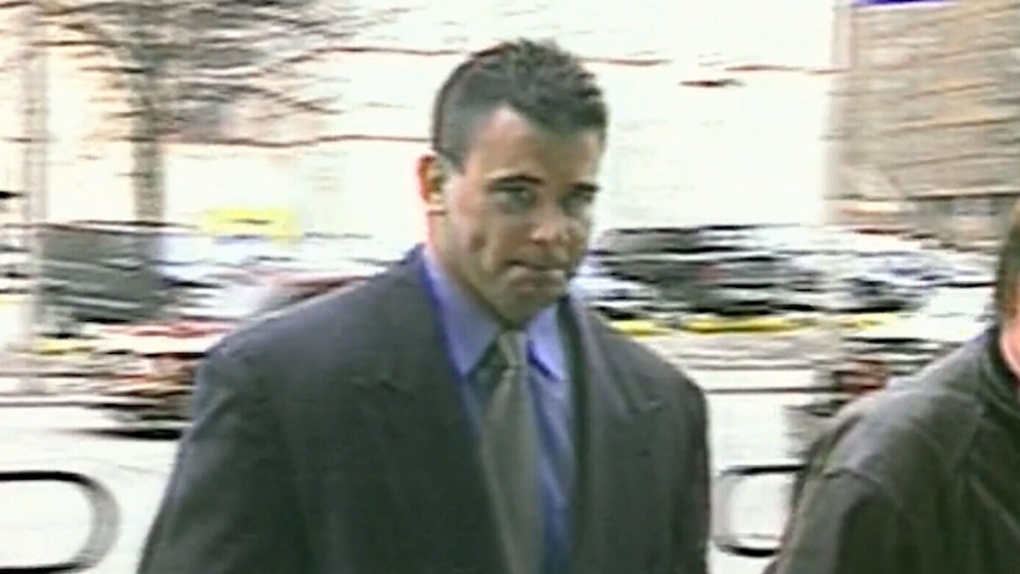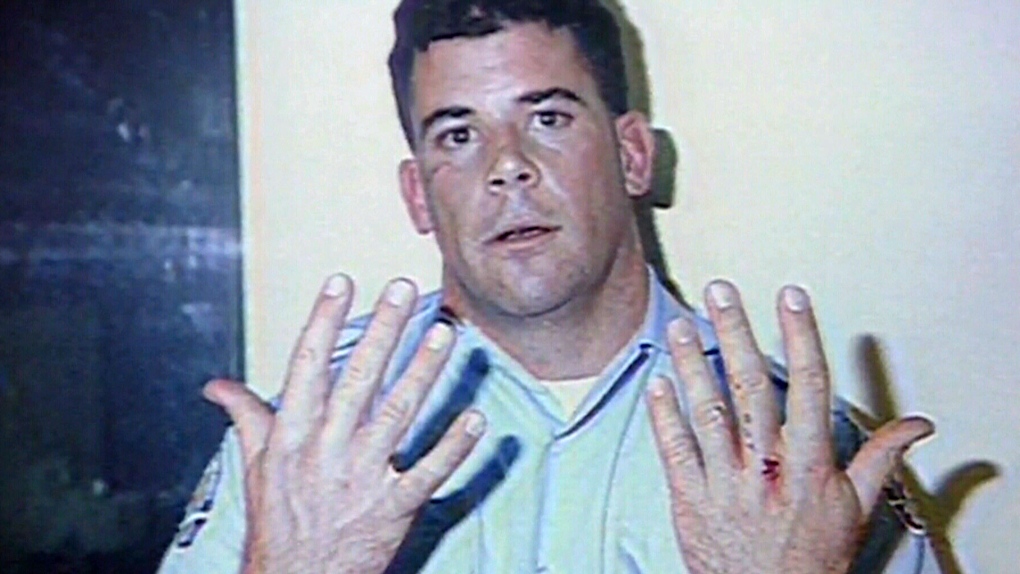Toronto Police Chief stands by promotion of officer who killed two Black men in the 1990s
Toronto’s police chief is standing by the decision to appoint an officer cleared after killing two black men and accused in court of beating a third in the 1990s, even as a city councillor is asking questions about the hiring decision.
In answers to questions from CTV News Toronto at an unrelated press conference, Chief Myron Demkiw said Supt. Rick Shank was investigated decades ago by police watchdogs.
 Toronto Police Chief Myron Demkiw answers questions from the media about Supt. Rick Shank.He said Shank has been performing “at the highest level” since and deserved a promotion to lead the professional standards unit, which is responsible for liaising with police watchdogs and officer accountability.
Toronto Police Chief Myron Demkiw answers questions from the media about Supt. Rick Shank.He said Shank has been performing “at the highest level” since and deserved a promotion to lead the professional standards unit, which is responsible for liaising with police watchdogs and officer accountability.
“He was exonerated and cleared. And he has been an exemplary police officer serving our public, keeping our city safe,” Demkiw said.
But the chief steered clear of answering a call from Toronto City Councillor Jamaal Myers to open up the records on the decision to promote Shank over any other qualified candidate without Shank's history.
“It was disturbing. A lot of people were disturbed,” said Myers in an interview. “They should have known that there would be this type of reaction to this appointment particularly from the Black community.
“The onus is on them to show us that they did their due diligence on this individual and this individual is the right individual for this position,” he said.
Shank was hired two years ago, and Demkiw was on the panel that recommended his promotion to the Toronto Police Services Board, records show.
In that package to the board on the promotions, there was no mention of Shank’s history in the 1990s.
In 1993, Shank killed Ian Coley, saying the young man pointed a gun at him first. The SIU cleared him for that interaction, which sparked a coroner's inquest that recommended an end to using “non-white” as a term in police communications and asked for transparency about what was then known as the “Black Organized Crime Unit.”
Lawyer Peter Rosenthal represented Coley’s family at the inquest in 1995. Reached this week by CTV NewsToronto, Rosenthal said he had concerns about Shank’s new position.
“Someone who killed two people like that, under questionable circumstances, should not be the head of professional standards in my view. He should not have been allowed to continue as a police officer,” Rosenthal said.
 Toronto police Supt. Rick Shank seen in this decades-old footage. (CTV News Toronto)Later that year, a court judgment says Shank and his partner arrested a young man named Paul Reece after stopping him on the street next to a car with its motor running. The officers testified the man pushed them and ran, they chased him to his house and his family members testified there was a brawl.
Toronto police Supt. Rick Shank seen in this decades-old footage. (CTV News Toronto)Later that year, a court judgment says Shank and his partner arrested a young man named Paul Reece after stopping him on the street next to a car with its motor running. The officers testified the man pushed them and ran, they chased him to his house and his family members testified there was a brawl.
A civil lawsuit alleged that Shank and his partner took Reece to a cemetery on the way to the police station and beat him; a video shows an unconscious Reece being pulled from the police car and a photo from one court proceeding shows Shank holding up bloody knuckles.
There was no lawful reason to arrest Reece, a criminal court judge found: “The officers were simply acting intuitively on a hunch, as in their view the area is a “drug infested area” and the vehicle might be stolen.”
Shank faced no internal discipline for the incident and the civil lawsuit was settled out of court.
In 1997, Shank shot and killed Hugh Dawson in a drug bust as Dawson, unarmed, sat in his car driver’s seat. The SIU charged Shank with manslaughter, who claimed that Dawson had reached for his gun. A first trial resulted in a hung jury; a second resulted in an acquittal.
 In a statement, the Toronto Police Board said its promotions procedures recognize that police officers may be involved in incidents that prompt “scrutiny, concern, complaints or charges” but allows promotions in some cases where there was a finding of no wrongdoing.
In a statement, the Toronto Police Board said its promotions procedures recognize that police officers may be involved in incidents that prompt “scrutiny, concern, complaints or charges” but allows promotions in some cases where there was a finding of no wrongdoing.
“The Board’s Policy, and the associated Service Procedure and promotional process, have carefully balanced the need to ensure that all relevant information is considered when assessing a Service Member’s suitability for promotion, with the importance of honouring the presumption of innocence, a tenet central to our legal system,” the statement says.
CTVNews.ca Top Stories

Ottawa has sold its stake in Air Canada: sources
Two senior federal government sources have confirmed to CTV News that the federal government has sold its stake in Air Canada. During the COVID-19 pandemic in 2021, the government purchased a six per cent stake in the airline for $500 million as part of a bailout package.
Premiers disagree on whether Canada should cut off energy supply to U.S. if Trump moves ahead with tariffs
Some of Canada's premiers appeared to disagree with Ontario Premier Doug Ford on his approach to retaliatory measures, less than a day after he threatened to cut off the province's energy supply to the U.S. if president-elect Donald Trump follows through on his threat of punishing tariffs.
BREAKING B.C. carjacking suspect illegally crossed U.S. border before arrest, police say
Authorities have arrested a suspect who allegedly carjacked a pickup truck in B.C.'s Lower Mainland on Thursday, then illegally crossed the U.S. border.
She took a DNA test for fun. Police used it to charge her grandmother with murder in a cold case
According to court documents, detectives reopened the cold case in 2017 and then worked with a forensics company to extract DNA from Baby Garnet's partial femur, before sending the results to Identifinders International.
Travis Vader, killer of Lyle and Marie McCann, denied day parole
The man who killed an Alberta couple in 2010 has been denied day parole.
McDonald's employee who called 911 in CEO's shooting is eligible for reward, but it will take time
More than 400 tips were called into the New York Police Department's Crime Stoppers tip line during the five-day search for a masked gunman who ambushed and fatally shot UnitedHealthcare CEO Brian Thompson last week.
Man who set fires inside Calgary's municipal building lost testicle during arrest: ASIRT
Two Calgary police officers have been cleared of any wrongdoing in an incident that saw a suspect lose a testicle after being shot with an anti-riot weapon.
Country star Morgan Wallen sentenced in chair-throwing case
Country music star Morgan Wallen on Thursday pleaded guilty to two misdemeanour counts of reckless endangerment for throwing a chair from the rooftop of a six-storey bar in Nashville and nearly hitting two police officers with it.
Weather warnings for hazardous conditions in parts of Canada
Canadians experienced contrasting weather on Thursday, from warmer temperatures in the Maritimes to extreme cold in parts of Ontario, the Prairies and the North.


































